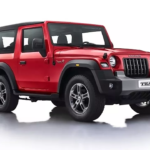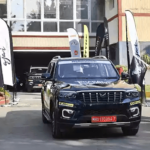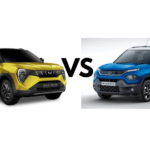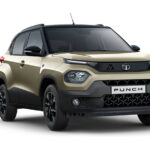

Hero Mavrick 440 first ride review: Hero’s Top Gun?
[ad_1]
Watch: Hero Mavrick 440 review: Hero’s own Top Gun?
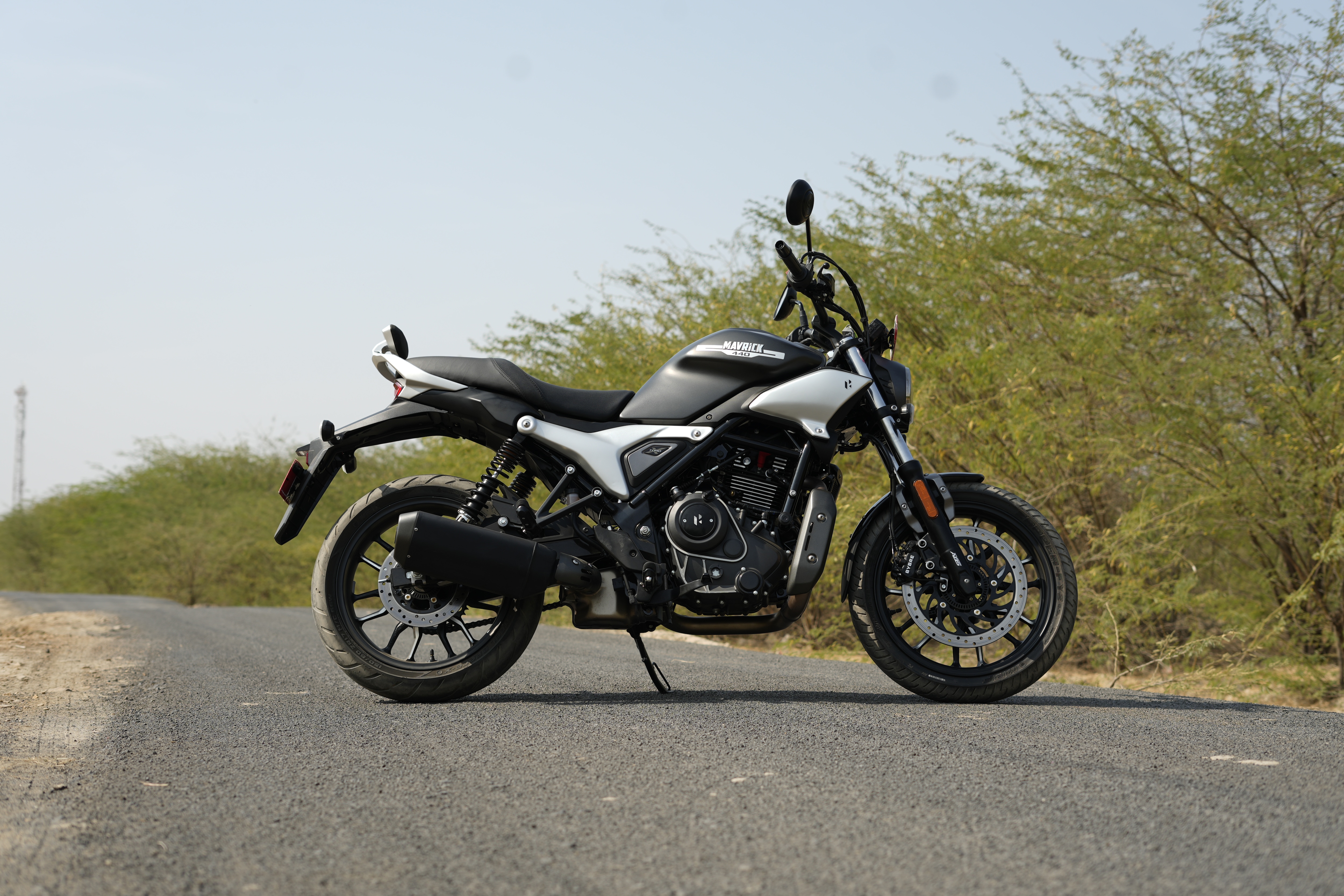
Hero Mavrick 440: Platform and Design
No points for guessing, the Harley-Davidson X440 and Hero Maverick share the same platform. The bikes were developed together and while the Harley is a traditional cruiser, the Mavrick has been designed as a neo-roadster. Both motorcycles are nothing like each other visually. The Mavrick looks more modern and with muscular lines all over. The round LED headlamp with the signature LED DRL looks great, while the bulbous fuel tank adds to the visual mass. The air shrouds on either side of the fuel tank are made out of metal and so are several parts of the motorcycle. Hero says that Mavrick gets fewer metal components over the X440, but there is a solid “build to last” feel to the motorcycle.
While the design is completely different, there are major changes underneath the body work. The Mavrick gets a shorter wheelbase with the rake more inwards and upright over the X440. The taller rake angle ensures a sportier riding experience when compared to the laidback style on the X440. The mainframe remains the same save for the attachment options for engine guards and other accessories, whereas the rear subframe has been revised to twin tubular units. Hero has got the tail section design done better than what we remember on the Harley X440. While that seemed like an afterthought, the Mavrick’s rear integrates more seamlessly.
The overall build quality, as well as fit and finish on the Mavrick is on point. Right from the welds, shut lines, and paint quality, all exude a premium feel. We were riding the top-of-the-line variant of the motorcycle, which gets a machined finish on the alloy wheels and engine casing, as well as a 3D Mavrick badge on the fuel tank.
Hero Mavrick 440: Features
The Hero Mavrick 440 uses an LCD instrument console with a negative backlit display. The unit is simple, feature-rich and easy to read under direct sunlight. It’s not the fanciest of the consoles seen in the segment but certainly fulfils the utility part. All variants get Bluetooth connectivity with turn-by-turn navigation as standard, which is a great decision on Hero’s part, while the connected features comprising rider telemetry, geofencing, and more, are available on the top-spec variant. Interestingly, the top variant of the Mavrick is only available in matte black or gloss black colour options, while the mid variant gets the nicer gloss blue and red colours. The base trim is available only in the white shade with spoke wheels.
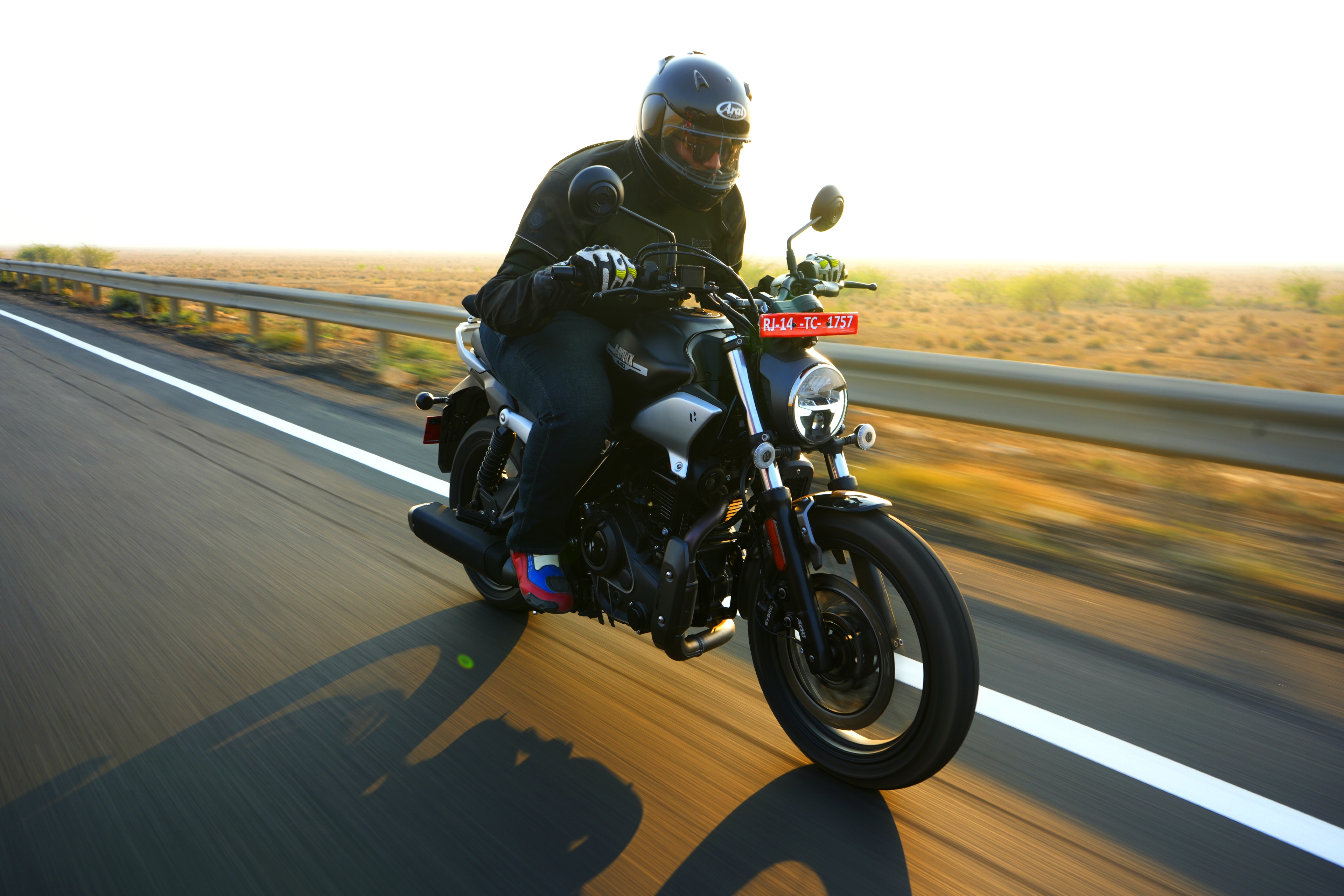
Hero Mavrick 440: Platform and Design
No points for guessing, the Harley-Davidson X440 and Hero Maverick share the same platform. The bikes were developed together and while the Harley is a traditional cruiser, the Mavrick has been designed as a neo-roadster. Both motorcycles are nothing like each other visually. The Mavrick looks more modern and with muscular lines all over. The round LED headlamp with the signature LED DRL looks great, while the bulbous fuel tank adds to the visual mass. The air shrouds on either side of the fuel tank are made out of metal and so are several parts of the motorcycle. Hero says that Mavrick gets fewer metal components over the X440, but there is a solid “build to last” feel to the motorcycle.
While the design is completely different, there are major changes underneath the body work. The Mavrick gets a shorter wheelbase with the rake more inwards and upright over the X440. The taller rake angle ensures a sportier riding experience when compared to the laidback style on the X440. The mainframe remains the same save for the attachment options for engine guards and other accessories, whereas the rear subframe has been revised to twin tubular units. Hero has got the tail section design done better than what we remember on the Harley X440. While that seemed like an afterthought, the Mavrick’s rear integrates more seamlessly.
The overall build quality, as well as fit and finish on the Mavrick is on point. Right from the welds, shut lines, and paint quality, all exude a premium feel. We were riding the top-of-the-line variant of the motorcycle, which gets a machined finish on the alloy wheels and engine casing, as well as a 3D Mavrick badge on the fuel tank.
Hero Mavrick 440: Features
The Hero Mavrick 440 uses an LCD instrument console with a negative backlit display. The unit is simple, feature-rich and easy to read under direct sunlight. It’s not the fanciest of the consoles seen in the segment but certainly fulfils the utility part. All variants get Bluetooth connectivity with turn-by-turn navigation as standard, which is a great decision on Hero’s part, while the connected features comprising rider telemetry, geofencing, and more, are available on the top-spec variant. Interestingly, the top variant of the Mavrick is only available in matte black or gloss black colour options, while the mid variant gets the nicer gloss blue and red colours. The base trim is available only in the white shade with spoke wheels.
Hero Mavrick 440: Ergonomics
The Mavrick gets an upright riding posture which is great for long rides with the wide handlebar. The handlebar is also positioned closer to the rider and allows the upper half of the body to be fatigue-free, which sits well with the touring intent of the motorcycle. The lower half though gets slightly rear-set footpegs. They add a bit of a sporty touch to the riding posture but there is a sense of disconnect when you get on top of the motorcycle. We would’ve liked a slightly more dedicated riding posture instead of the pure upright stance. Given the torquey nature of the bike, it would’ve added to the riding experience.
The 803 mm seat height makes it quite accessible but you do feel like you’re sitting on a taller motorcycle given the tall handlebar. On the bright side, standing up and riding the bike feels more convenient. We would recommend getting broader footpegs though if you intend to stand on them more often.
The seat cushioning remains a major point of concern for us on the Mavrick. Despite the nearly 300 km ride, the motorcycle wasn’t as comfortable as we hoped. Hero claimed special emphasis on comfort but the “deep cushioned” seat emerged to be a bit harder than we liked. We raised this with the Hero team who told us that they were cognizant of the issue and this was specific to the pre-production bikes we were riding. The production version should get softer cushioning. The seat design itself is quite wide with decent space for the rider and pillion. However, we’d like to see how the cushioning turns out on the production bikes.
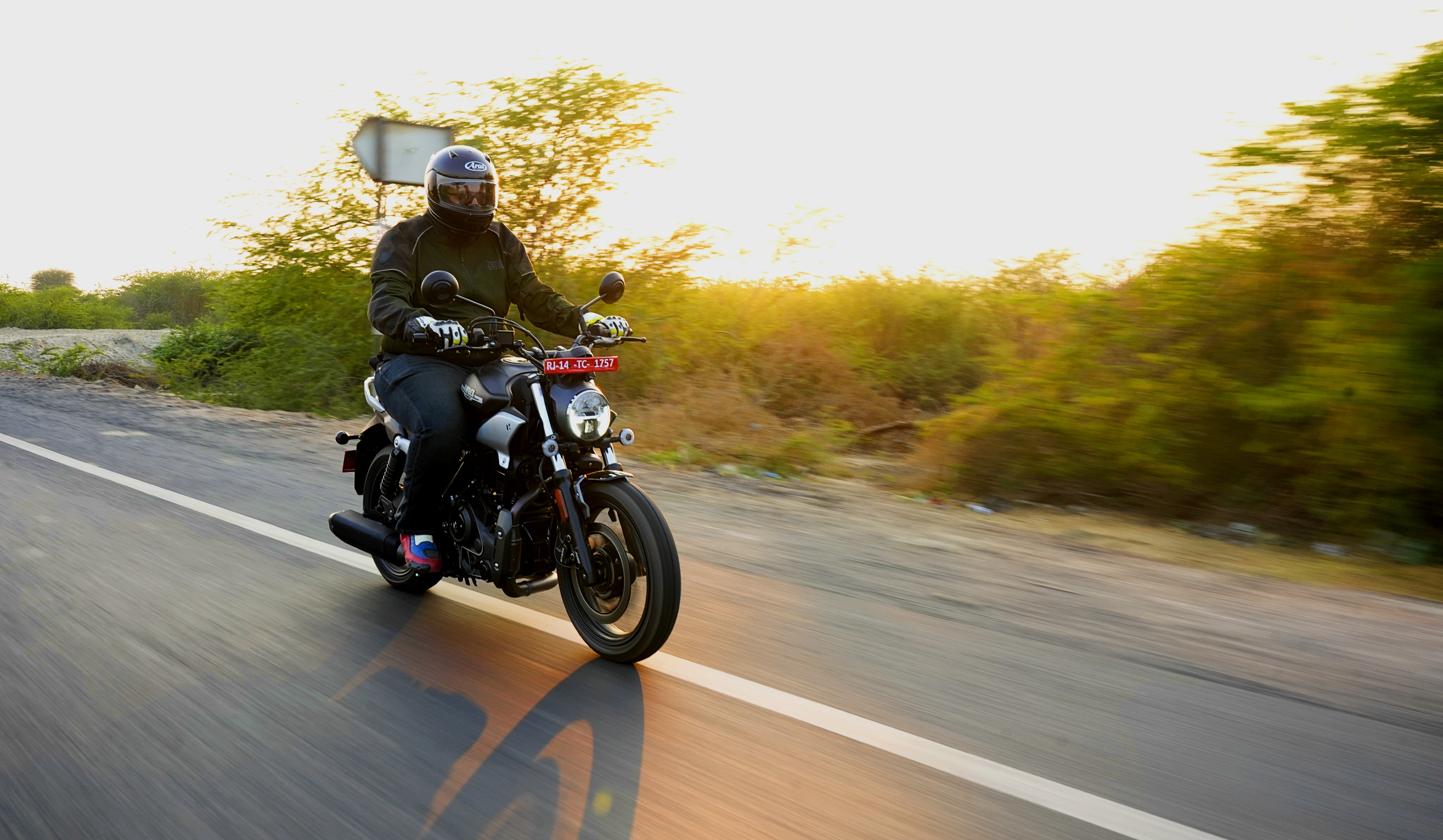
Hero Mavrick 440: Performance
The Hero Maverick 440 is a torque-friendly motorcycle. The 440 cc single-cylinder, air and oil-cooled motor remains the same as the X440 but with subtle changes in the tuning. The motor develops 27 bhp at 6,000 rpm and 36 Nm of peak torque at 4,000 rpm. Hero says 90 per cent of the torque is available right from 2,000 rpm. This is an extremely tractable motor and you will enjoy the low-end and mid-range quite strongly on the bike. You could be in sixth gear at 45 kmph and the bike will be easy to ride.
The open and traffic-free roads of Kutch, Gujarat, allowed us to stretch this engine’s legs quite a few times. The bike feels easy to ride and we do think this is one of the easiest motorcycles to ride in the sub-500 single-cylinder space. You could slot it in third gear and ride around the city at 50 kmph all day, or take it to the highway, luggage in tow, and cruise at 80 kmph. The bike behaves at its best at 80 kmph around 4,000 rpm, which is its sweet spot out on the highway. Stretch it a little more and you will find the NVH levels getting harder on the motorcycle. Vibrations start creeping in at 5,000 rpm around the foot pegs and handlebar. The bike is easy to ride with a bit of a buzz around 100 kmph, which only grows from there. We managed to hit a top speed of 130 kmph but you won’t be able to stay there for long given the mild but noticeable vibrations at triple-digit speeds.
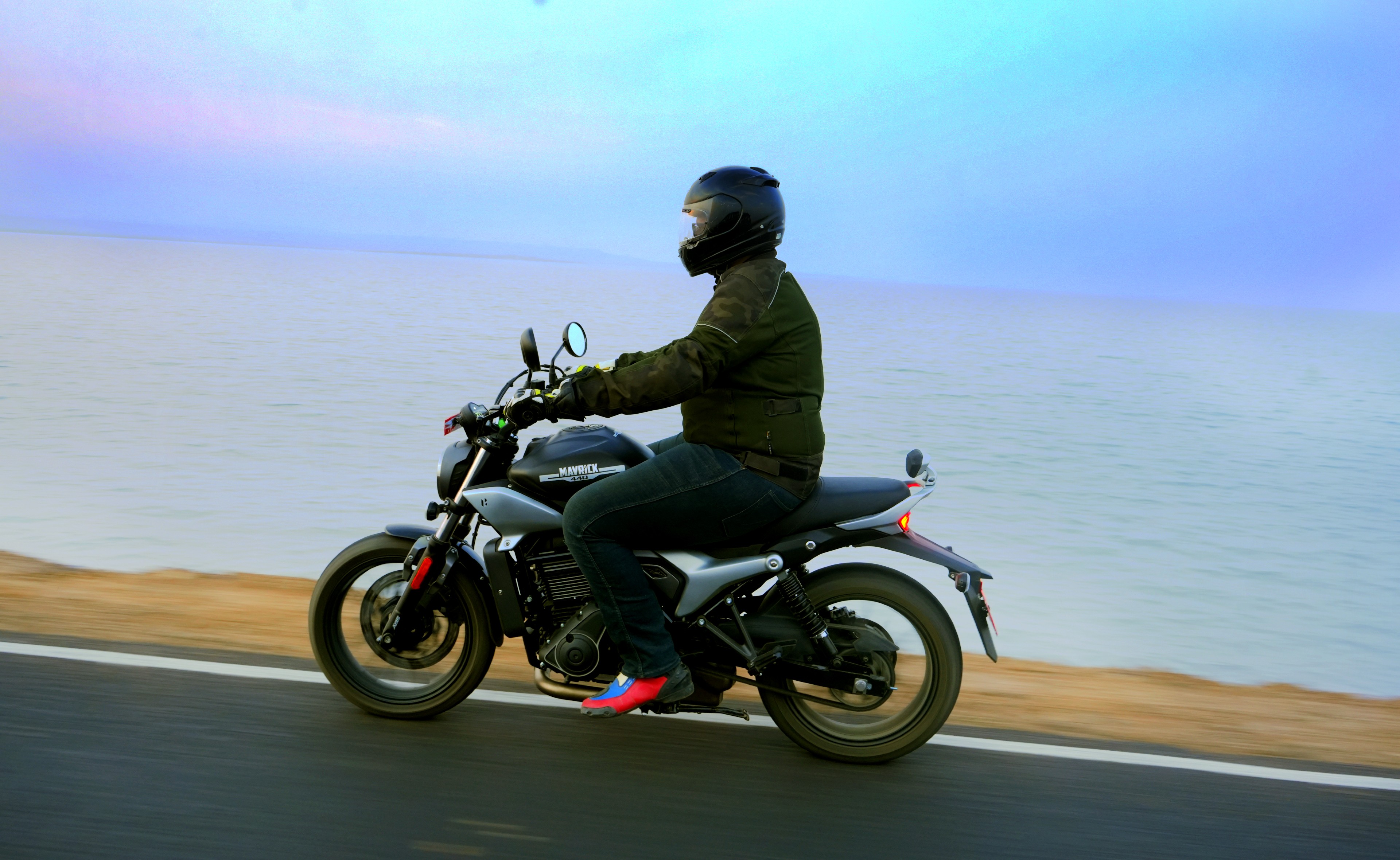
H ero Mavrick 440: Performance
The Hero Maverick 440 is a torque-friendly motorcycle. The 440 cc single-cylinder, air and oil-cooled motor remains the same as the X440 but with subtle changes in the tuning. The motor develops 27 bhp at 6,000 rpm and 36 Nm of peak torque at 4,000 rpm. Hero says 90 per cent of the torque is available right from 2,000 rpm. This is an extremely tractable motor and you will enjoy the low-end and mid-range quite strongly on the bike. You could be in sixth gear at 45 kmph and the bike will be easy to ride.
The open and traffic-free roads of Kutch, Gujarat, allowed us to stretch this engine’s legs quite a few times. The bike feels easy to ride and we do think this is one of the easiest motorcycles to ride in the sub-500 single-cylinder space. You could slot it in third gear and ride around the city at 50 kmph all day, or take it to the highway, luggage in tow, cruise at 80 kmph. The bike behaves at its best at 80 kmph around 4,000 rpm, which is its sweet spot out on the highway. Stretch it a little more and you will find the NVH levels getting harder on the motorcycle. Vibrations start creeping in at 5,000 rpm around the foot pegs and handlebar. The bike is easy to ride with a bit of a buzz around 100 kmph, which only grows from there. We managed to hit a top speed of 130 kmph but you won’t be able to stay there for long given the mild but noticeable vibrations at triple-digit speeds.
Hero Mavrick 440: Handling and Suspension
For the amount of emphasis Hero made on comfort on the Maverick, I do feel it is a bit lacking when it comes to the suspension setup. This is slightly firmer than what I would’ve liked for What is supposed to be a tourer. The bike uses telescopic forks at the front and twin shocks with a 7-step preload at the rear, which Hero says was intended to bring a rugged quality to the motorcycle, which its customers like. That said, the basic suspension does not translate to a plush riding experience.
The rather firm suspension coupled with the hard cushioning further makes the ride quality rigid on the Mavrick. The suspension offers 130 mm of travel at either end but is rigid over undulations. Show it a bad stretch and most potholes will travel to the rider’s back. The rear suspension could’ve been tuned better and we think a more plush ride would certainly help the touring nature of the bike.
Cornering effort is easy and the Mavrick feels predictable around the bend. It only adds to the easy nature of the motorcycle and makes it quite manageable despite a kerb weight of 187 kg. We would like to see USD front forks on the Mavrick though, which should make the bike more planted at high speeds and also on par with most of what the competition has to offer.
Braking performance is good and the progressive nature of the front brakes is confidence-inspiring. The rear brake feels quite predictable even though the lever has some squishy feel to it. That said, the brakes work just fine without the dual-channel ABS being intrusive.
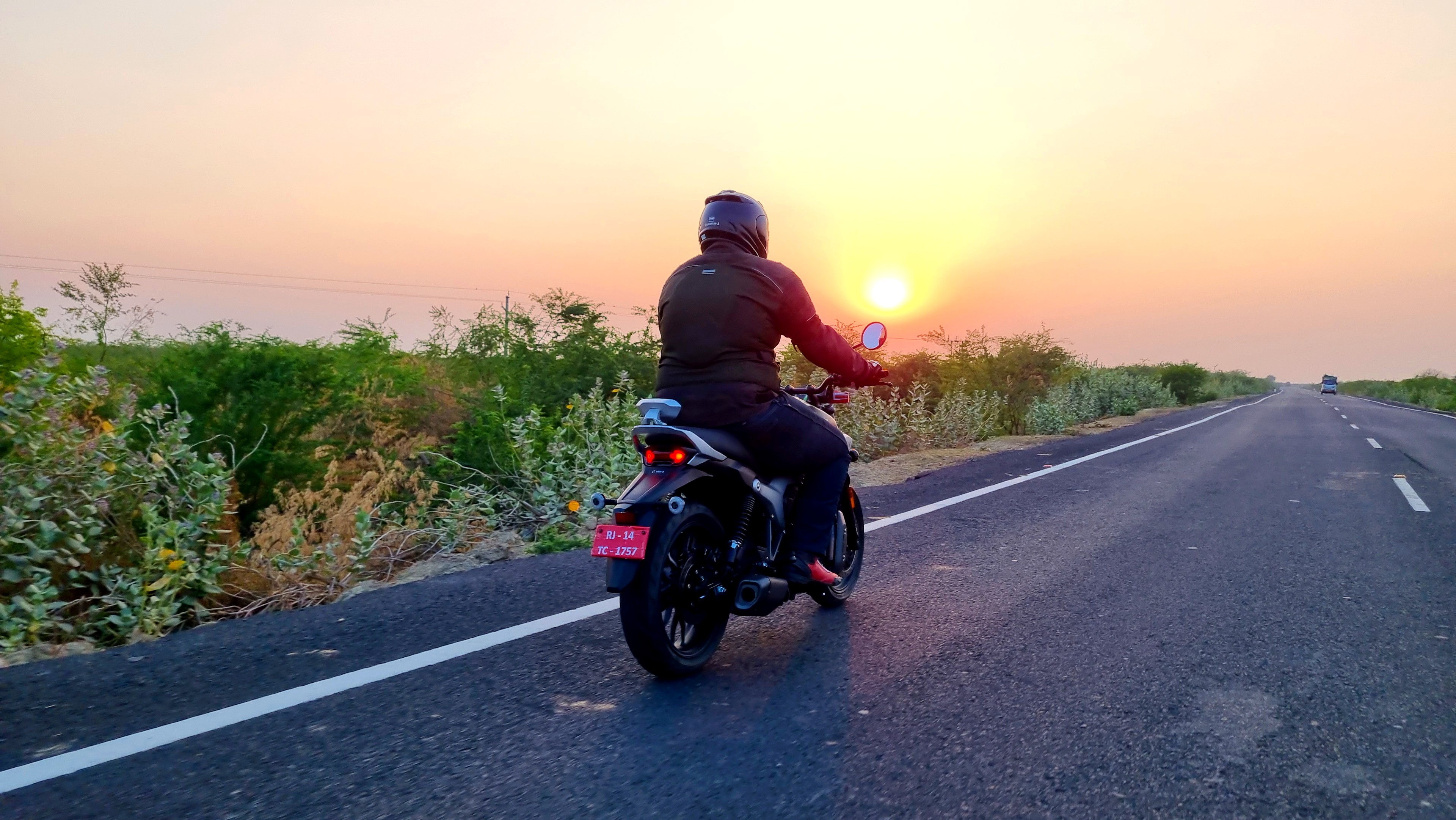
Hero Mavrick 440: Verdict
The Hero Mavrick comes across as a stellar deal starting at ₹1.99 lakh, going up to ₹2.24 lakh (ex-showroom, Delhi). Those prices are fantastic prices and the most competitive in the sub-500 cc segment. A lot of customers would want to check out the Mavrick purely for its stellar price. Yes, it does get away with the lack of a few features including a TFT screen, and USD forks, but it’s still a long feature list across all three variants.
Despite the low asking price, the competition offers a lot more in terms of both equipment and performance, which the Mavrick lacks in some areas. Having said that, we do think of it as a fun motorcycle and the one that will be easiest to ride. Add to that Hero’s wide service network and there’s plenty for you to consider, especially once you factor in that delectable price tag.
First Published Date: 19 Feb 2024, 11:39 AM IST
[ad_2]
Source link
Add a comment Cancel reply
Categories
- Car News (2)
- Cars News (91)
- Electric Cars (76)
- Electric Two-wheeler (76)
- Electric Vehicle (76)
- Experts Reviews (2)
- Gallery (11)
- New Arrivals (378)
- Uncategorized (1)
- Used Cars (54)
- XUV Cars (2)
Recent Posts
Related posts



